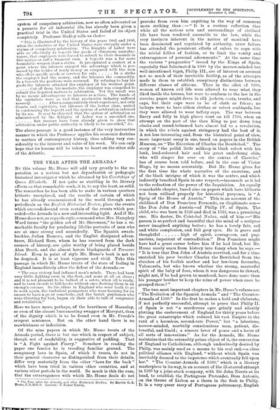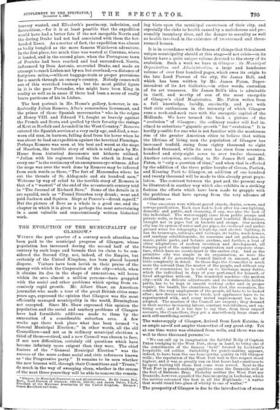THE YEAR AFTER THE ARMADA.*
BY this volume Mr. Hume will add very greatly to the re- putation as a serious but not dryasdustish or pedagogic historical investigator which he obtained by his Courtships of
Queen Elizabeth. If not quite so startling in its literary effects as that remarkable work, it is, to say the least, as solid. The researches he has been able to make in various quarters hitherto unexplored, and the results of certain of which he has already communicated to the world through such periodicals as the English Historical Review, place the events which succeeded—and even certain of the events which pre- ceded—the Armada in a new and interesting light. And if Mr. Hume does not, as regards style, command what Mrs. Humphry Ward terms "the golden art of Mr. Stevenson," he has a re- markable faculty for producing lifelike portraits of men who are at once strong and scoundrelly. The Spanish swash- buckler, Julian Romero, and the English dissipated adven- turer, Richard Bere, whom he has rescued from the dark corners of history, are quite worthy of being placed beside Alan Breck, and the almost heroic blackguards of Treasure Island. Even in point of style Mr. Hume's book is not to be despised. It is at least vigorous and vivid. Take this passage in which Mr. Hume treats of the state of feeling in England immediately after the defeat of the Armada :—
" The easy victory had inflamed men's minds. There had been very little fighting even in the fleet, and none at all on shore ; and it is not pleasant to be balked of a set-to, when all is ready, and to turn swords to bill-hooks without once fleshing them in an enemy's carcase. So the idlers in England who were loath to go to work again, the turbulent youngsters who were burning for an excuse to have a go at somebody, and the lavish gentlemen who were thirsting for loot, began on their side to talk of vengeance and retaliation."
Here we have more, perhaps, of the heartiness of Macaulay, or even of the almost buccaneering swagger of Marryatt, than of the dignity which is to be found even in Mr. Froude's crispest sentences. But on the other hand there is no mawkishness or indecision.
Of the nine papers in which Mr. Hume treats of the Armada period, there is but one which in respect of subject, though not of readability, is suggestive of padding. That is " A Fight against Finery." Somehow in reading the paper one fancies he is treading familiar ground. The sumptuary laws in Spain, of which it treats, do not in their general character as distinguished from their details, differ very materially from the other "laws for the back" which have been tried in various other countries, and at various other periods in the world. So much is this the case, that the extravagances with which Mr. Hume deals do not
• The Year after the Armada, and other Historical Studies. By Martin 0. S. Hume, F.R.Hist.S. London; T. Fisher Unwin.
provoke from even him anything in the way of comment more striking than : —" It is a curious reflection that while all the serious acts and surroundings of civilised life have been rendered amenable to the law, while the very instincts inherent in the nature of mankind have been dominated and regulated by authority, utter failure has attended the persistent efforts of rulers to cope with the trivial follies of fashion, or to limit the vanity and extravagances of personal adornments." At the same time the various " pragmatics " issued by the Kings of Spain, especially that fulminated in 1600 by the narrow-minded but well-intentioned bigot, Philip III., are of interest on account not so much of their inevitable futility, as of the attempts made in them to establish sumptuary distinctions between different classes of citizens. Thus in the edict of 1600, women of known evil life were allowed to wear what they liked inside the houses, but were to conform to the law in the streets; pages might dress in silk jackets, coats, trunks, and caps, but their caps were to be of cloth or frieze ; no lackeys were to have silken clothes or velvet scabbards, but they were allowed to wear taffety caps. The war between finery and folly in high places went on till 1766, when an attempt on the part of the then King to put down long cloaks and round-brimmed hats almost led to a revolution, in which the rebels against stringency had the best of it. A not less interesting and, from the historical point of view, more important essay is one, based on papers in the British Museum, on "The Exorcism of Charles the Bewitched." The story of " the pallid little milksop in black velvet with his lank, loud-coloured hair and his great underhung chin, who will simper for ever on the canvas of Carreno," has of course been told before, and in the case of Victor Hugo, by no means accurately. But Mr. Hume gives for the first time the whole narrative of the exorcism, and of the black intrigue of which it was the centre, and which indirectly benefited Spain in one respect,—inasmuch as it led to the reduction of the power of the Inquisition. An equally remarkable chapter, based also on papers which have hitherto not been utilised properly for historical purposes, is "A Sprig of the House of Austria." This is an account of the childhood of Don Francisco Fernando, an illegitimate son— like Don John of Austria—of Philip IV. of Spain. The child, who was born in 1526 and died in 1534, was a promising one. His doctor, Dr. Cristobal Nunez, said of him :—" His person is so perfect and beautiful that the mind of a sculptor never imagined anything better ; he has a lovely fair, red and white complexion, and full grey eyes. He is grave and thoughtful high of spirit, courageous, and pug- nacious, impatient of contradiction." Don Francisco might have had a great career before him if he had lived, but Mr. Hume surely soars from history into fancy when he says :- " It is true that Don John of Austria survived, and for a time snatched his poor brother Charles the Bewitched from the clutches of his foolish mother and her low-born favourite, Valenzuela, but who knows whether the strong, masterful spirit of the baby of four, whom it was dangerous to thwart, might not, if he had grown to manhood, have done more than his younger brother to keep the reins of power when once he grasped them ?"
The two most important chapters in Mr. Hume's volume are " The Evolution of the Spanish Armada " and " The Counter- Armada of 1589." In the first he makes a bold and elaborate, if not perfectly successful, attempt to prove that Philip II. of Spain is not "a murderous ogre grimly and silently plotting the enslavement of England for thirty years before the great catastrophe which reduced his vast Empire to the rank of a harmless, second-rate Power," but "a laborious, narrow-minded, morbidly conscientious man, patient, dis- trustful, and timid ; a sincere lover of peace and a hater of all sorts of innovations." As for the Armada, Mr. Hume maintains that the ostensibly prime object of it, the conversion of England to Catholicism, although undoubtedly desired by Philip, was mainly used as a means to his real end,—a close
political alliance with England, " without which Spain was inevitably doomed to the impotence which eventually fell upon her." " The Counter-Armada, of 1589," which is a, literary masterpiece in its way, is an account of the ill-starred attempt in 1589 by a joint-stock company, with Sir John Norris at its head, to establish the Portuguese Pretender, Dom Antonio, on the throne of Lisbon as a thorn in the flesh to Philip. It is a very queer story of Portuguese poltroonery, English and Elizabeth's parsimony, indecision, and bravery wasted, favouritism,—for it is at least possible that the expedition would have had a better fate if the not incapable Norris and the daring Drake had not bad associated with them the hot- headed Essex. As a matter of fact, the expedition was almost as badly bungled as the more famous Walcheren adventure. In the first place, too much time was wasted at Corunna, where it landed, and in the second place, when the Portuguese town of Peniche had been reached and had surrendered, Norris, influenced by Dom Antonio, overruled Drake, and made an attempt to reach Lisbon not by sea but overland,—a distance of forty-two miles,—without baggage-train or proper provisions for a march through an enemy's country. Nobody comes well out of this wretched business ; but the most pitiful figure in it is the poor Pretender, who might have been King in reality as well as in name if there had been a score of really brave partisans of his in Lisbon.
The best portrait in Mr. Hume's gallery, however, is un- doubtedly Julian Romero, Alba's remorseless lieutenant, and the prince of those Spanish mercenaries " who in the reigns of Henry VIII. and Edward VI. fought so bravely against the French and Scots, and quelled by their ferocity the risings of Kett in Norfolk and Arundell in the West Country." Romero entered the Spanish service at a very early age, and died, a war- worn old man, in harness, falling dead from his horse when he was about to lead an expedition against the heretical Flemings. Perhaps Romero was seen at his best and worst at the siege of Haarlem, the terrible story of which is told again by Mr. Hume from historical documents not hitherto utilised. "Julian with his regiment leading the attack in front of every one " is the testimony of an anonymous eye-witness. After the siege was over the work done by Romero may be inferred from such words as these, " The fort of Mansendus where he cut the throats of St. Aldegonde and six hundred men." Welcome by way of relief to the terrible story of Romero is that of a " wastrel " of the end of the seventeenth century told in " The Journal of Richard Bere." Some of the details in it are squalid, such as " Found Stourton very drunk ; went and paid Jackson and Squires. Slept at Pearce's—drunk myself." Bat the picture of Bere as a whole is a good one, and the chapter in which it is given is perhaps the most entertaining in a most valuable and conscientiously written historical work.























































 Previous page
Previous page